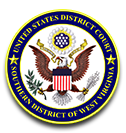- Procedure for Admission.
Any person who has not been admitted to practice before the Supreme Court of Appeals of West Virginia, but who is a member in good standing of the bar of the Supreme Court of the United States, the bar of the highest court of any other state in the United States, or the bar of the District of Columbia, shall be permitted to appear as a Visiting Attorney in a particular case in association with a Sponsoring Attorney as herein provided. The Sponsoring Attorney must be a member of the bar of this court, have an office for the practice of law in West Virginia, and practice law primarily in West Virginia. The Visiting Attorney shall file with the clerk, at or before his or her initial appearance (including signing a pleading), the Statement of Visiting Attorney adopted by order of this court, which is available from the clerk and on the court's web site, and shall pay the Visiting Attorney fee. The Statement shall designate a Sponsoring Attorney, upon whom pleadings, notices, and other papers may be served. The Sponsoring Attorney shall consent to the designation and shall thereafter sign all papers that require the signature of an attorney. Any paper filed by a Visiting Attorney not in compliance with this rule may be stricken from the record after 14 days written notice transmitted to the Visiting Attorney at his or her address as known to the clerk. Upon compliance with this rule and introduction of the Visiting Attorney to the court by the Sponsoring Attorney, the Sponsoring Attorney, with the consent of the court, may be excused from further attendance during the proceedings and the Visiting Attorney may continue to appear in that particular case.
- Motion Not Required.
Filing a properly completed Statement of Visiting Attorney and paying the Visiting Attorney fee constitute all steps necessary to qualifying as a Visiting Attorney for a particular case and no motion to appear as a Visiting Attorney is required.
- Payment of Visiting Attorney Fee.
- Fee Payable to Clerk. The court will charge a Visiting Attorney fee, payable to the Clerk, United States District Court, in an amount to be set by order. Pursuant to Judicial Conference policy, the fees will be used only for "purposes which inure to the benefit of the members of the bench and the bar in the administration of justice." Other than library materials, the fees will not be used to supplement appropriated funds and will not be used to pay for materials or supplies available from statutory appropriations. The fees will be placed in a fund administered by the clerk as custodian of the fund. Disbursements will be made only at the direction of a committee, the members of which will be appointed by the Chief Judge, in accordance with a written plan.
- West Virginia State Bar Pro Hac Vice Fee. The pro hac vice fee imposed by the Supreme Court of Appeals of West Virginia applicable to Visiting Attorneys shall be paid to The West Virginia State Bar and is not payable to the clerk of the district court.
- Exceptions to Payment of Visiting Attorney Fee.
- Bankruptcy Cases. The Visiting Attorney fee will apply in every bankruptcy case in which the reference to the Bankruptcy Court has been withdrawn, and in every appeal of a bankruptcy case to the District Court. Otherwise, the imposition of a Visiting Attorney fee in a bankruptcy case will be governed by the Local Rules for Bankruptcy Court.
- Multidistrict Litigation Cases. Pursuant to the Rules of Procedure of the Judicial Panel on Multidistrict Litigation, a Visiting Attorney fee will not be charged in any case which is filed in this court pursuant to a transfer under said Rules.
- Miscellaneous Cases. A Visiting Attorney who files a miscellaneous case which does not require judicial action (e.g., one filed in order to obtain a subpoena) is exempt from paying the Visiting Attorney fee, from associating with a Sponsoring Attorney, and from filing the Statement of Visiting Attorney. A Visiting Attorney who files a miscellaneous case which does require judicial action (e.g., motion to compel testimony at a deposition) must comply with LR Civ P 83.6(a).
- Federal Government Attorneys. Attorneys employed by the United States Department of Justice or any other Federal department or agency will not be required to pay the Visiting Attorney fee.
- Law Students. Law students who participate in a case in accordance with these Rules will not be charged a Visiting Attorney fee.
- Waiver of Payment of Visiting Attorney Fee.
A Visiting Attorney and his/her Sponsoring Attorney may file a motion requesting a waiver of the Visiting Attorney fee in a particular case or cases, for good cause shown. The motion will be decided by the judge assigned to the case; the motion should be filed within 21 days of the assignment of the case to the judge. Examples of cases in which waiver may be appropriate are: numerous collection actions filed by one plaintiff; numerous negligence actions filed by one firm representing many plaintiffs against one defendant or group of defendants arising out of a single incident or related incidents (e.g., a catastrophic fire, or exposure to a toxic substance). If a waiver is granted, the Visiting Attorney will pay such Visiting Attorney fee in an amount as ordered by the presiding district judge.
- Revocation of Visiting Attorney Privilege.
For good cause, the presiding district judge may revoke the privilege of an attorney to be a Visiting Attorney in one or more specified cases.
Admission of Visiting Attorneys
